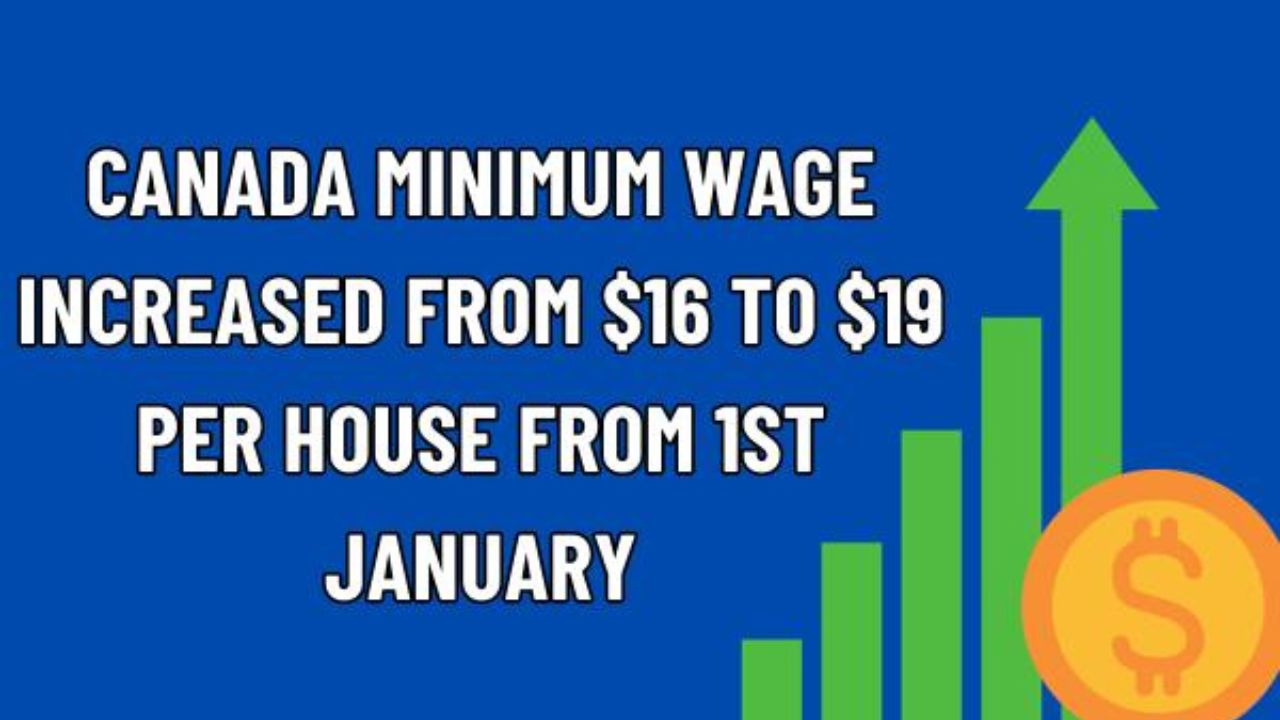Canada’s Minimum Wage Increased – The minimum wage in Nunavut, a territory of Canada, has increased to 19 CAD, with an expected 18% increase. Every year, on April 1st, the federal government updates the minimum wage; however, as of January 1st, 2024, Nunavut has increased its wage rate. These rates are the recommendation of the federal Department of Justice following an extensive study of growing inflation rates among employees and businesses. The Canada Minimum Wage Increase, which will rise from $16 to $19 per dwelling on January 1st, is covered in more detail in this post.
Canada Minimum Wage Increased from $16 to $19 Per Hour from 1st January:
The government has declared a new minimum salary for workers in the territory. These pay were determined after considering how living and working affect employers and employees. The Department of Justice has raised the federal minimum wage in Nunavut from $16 to $19 per hour. Given the growing cost of inflation, the rise in strikes has been justified.
A few interested parties are protesting the new Canada Minimum Wage rate, a 3 CAD increase. Following this increase, Nunavut now boasts Canada’s highest minimum wage. This raise will provide the workers an additional $120 per week to help them manage their monthly expenses and federal earnings amidst the growing cost of living.
Nonetheless, the government has taken these actions to raise worker income, which is beneficial. The company and the employees will benefit from this rise and be better equipped to handle their financial risk. Given that Nunavummiut has the highest cost of living due to rising inflation and cost of living increases, the increase will be an 18% boost.
The people most impacted by inflation were the focus of acknowledging Canada’s Minimum Wage hike. Workers in Nunavut will be paid $19 per hour starting January 1, 2024; this rate will apply to all workers. This adjustment aims to counteract Nunavut’s rising cost of living and inflation.
What is Minimum Wage?
The lowest amount of money given to an employee as legal compensation is known as the minimum wage. These are the federal rates that the company must pay on each employee’s salary. Since April 2023, the minimum wage in Canada has been fixed at $16.65 per hour. These are the hourly federal rates determined by growing inflation throughout a fiscal year.
However, the Nunavut government increased the minimum wage for its citizens by 3 CAD above the previous rates in 2024. In Canada, all employers must pay their staff the minimum wage to meet their necessities and care for their health. The Canada Minimum Wage guarantees equitable compensation, a respectable standard of life, protection, and general progress.
Canadian Hourly Wage’s Significance:
Minimum wage laws aim to give all workers a minimal standard of living, reducing poverty and economic inequality. Minimum wage increases, often tied to inflation and living expenses, safeguard the actual value of the pay over time.
Minimum wages have a significant impact on how labor markets and the economy as a whole are structured. They may affect the whole economy in addition to providing a minimum wage and essential worker safety.
The government can still change this minimum wage as much as necessary to suit economic demands; hence, it can increase or decrease based on the circumstances.
Canada Hourly Wage Effective Dates:
In 2024, the minimum hourly wage will increase in many places.
- On April 1, the minimum wage in Prince Edward Island will rise by $0.40 to $15.40. There will be an additional $0.60 increase on October 1st, making it $16.
- In addition to inflation, Nova Scotia’s $15 minimum wage will rise by 1% annually as of April 1st.
- On October 1, Ontario plans to raise the minimum wage, according to its annual practice, around this time of year. The minimum wage in Ontario is now $16.55 per hour.
Officials in Canada have announced that beginning on January 1, 2024, applicants for study permits would not be required to indicate the cost of living.
Who gets $19 in Canada?
Workers who their employers employ are entitled to the minimum pay. The Canadian territory of Nunavut will impose a minimum salary of $19, the country’s highest minimum wage rate. The hourly pay in Nunavut is 16 CAD in 2023.
Federally regulated drives pay working workers the federal minimum wage in Canada. All workers over the age of eighteen are typically entitled to these salaries. The $19 minimum wage for workers who qualify for Nunavut will assist individuals and households by providing higher hourly wages.
In addition to having the highest salary, Yukon boasts the second-highest provincial minimum wage at $16.77 per hour. Federal salaries are determined by the consumer price index plus an increase in the growing cost of living due to rising inflation. All of these rates go into effect on April 1st of each year. All Canadian workers are entitled to these minimum wages regardless of their province or territory’s pay rates.
Read Also – Types of Child Benefits in Australia and How to Claim?
